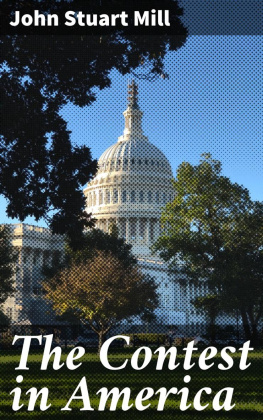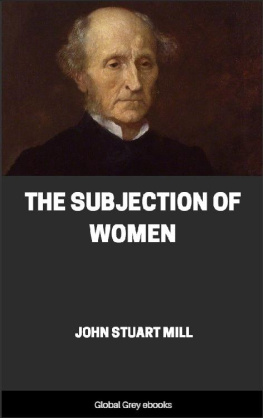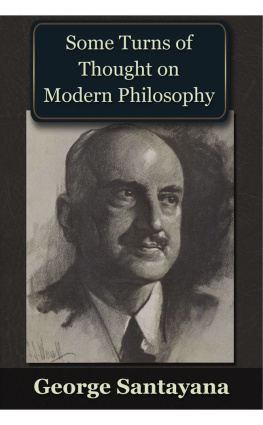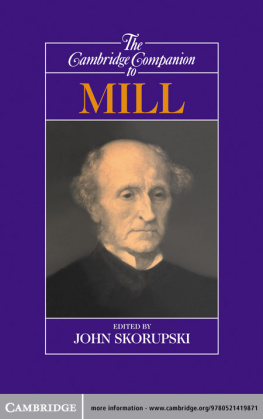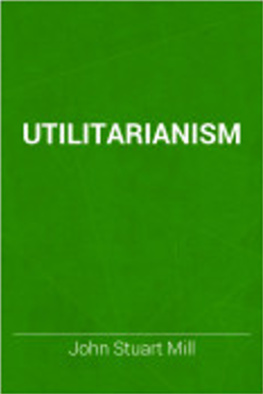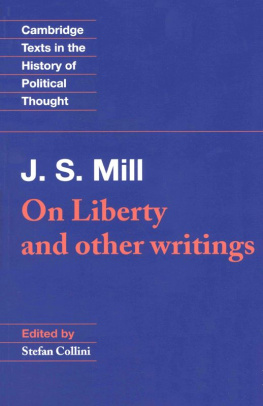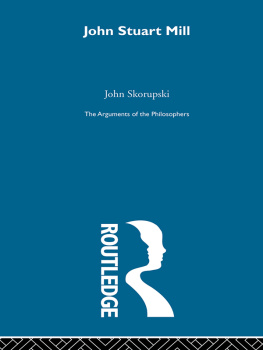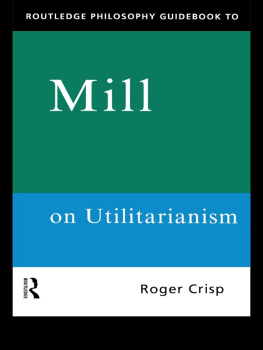Mill John Stuart - Consideration on Representative Government
Here you can read online Mill John Stuart - Consideration on Representative Government full text of the book (entire story) in english for free. Download pdf and epub, get meaning, cover and reviews about this ebook. genre: Science. Description of the work, (preface) as well as reviews are available. Best literature library LitArk.com created for fans of good reading and offers a wide selection of genres:
Romance novel
Science fiction
Adventure
Detective
Science
History
Home and family
Prose
Art
Politics
Computer
Non-fiction
Religion
Business
Children
Humor
Choose a favorite category and find really read worthwhile books. Enjoy immersion in the world of imagination, feel the emotions of the characters or learn something new for yourself, make an fascinating discovery.
- Book:Consideration on Representative Government
- Author:
- Genre:
- Rating:5 / 5
- Favourites:Add to favourites
- Your mark:
- 100
- 1
- 2
- 3
- 4
- 5
Consideration on Representative Government: summary, description and annotation
We offer to read an annotation, description, summary or preface (depends on what the author of the book "Consideration on Representative Government" wrote himself). If you haven't found the necessary information about the book — write in the comments, we will try to find it.
Consideration on Representative Government — read online for free the complete book (whole text) full work
Below is the text of the book, divided by pages. System saving the place of the last page read, allows you to conveniently read the book "Consideration on Representative Government" online for free, without having to search again every time where you left off. Put a bookmark, and you can go to the page where you finished reading at any time.
Font size:
Interval:
Bookmark:
by John Stuart Mill
Copyright laws are changing all over the world. Be sure to check the
copyright laws for your country before downloading or redistributing
this or any other Project Gutenberg eBook.
This header should be the first thing seen when viewing this Project
Gutenberg file. Please do not remove it. Do not change or edit the
header without written permission.
Please read the "legal small print," and other information about the
eBook and Project Gutenberg at the bottom of this file. Included is
important information about your specific rights and restrictions in
how the file may be used. You can also find out about how to make a
donation to Project Gutenberg, and how to get involved.
**Welcome To The World of Free Plain Vanilla Electronic Texts**
**eBooks Readable By Both Humans and By Computers, Since 1971**
*****These eBooks Were Prepared By Thousands of Volunteers!*****
Title: Considerations on Representative Government
Author: John Stuart Mill
Release Date: May, 2004 [EBook #5669]
[Yes, we are more than one year ahead of schedule]
[This file was first posted on August 5, 2002]
Edition: 10
Language: English
*** START OF THE PROJECT GUTENBERG EBOOK, CONSIDERATIONS ON REPRESENTATIVE GOVERNMENT ***
Redacted by Curtis A. Weyant
[Footnotes initially found throughout the text have been numbered and placed at the end of the text.]
CONSIDERATIONS
ON
REPRESENTATIVE GOVERNMENT
BY
JOHN STUART MILL,
AUTHOR OF
"A SYSTEM OF LOGIC, RATIOCINATIVE AND INDUCTIVE"
NEW YORK:
HARPER & BROTHERS, PUBLISHERS,
FRANKLIN SQUARE
1862.
T hose who have done me the honor of reading my previous writings will probably receive no strong impression of novelty from the present volume; for the principles are those to which I have been working up during the greater part of my life, and most of the practical suggestions have been anticipated by others or by myself. There is novelty, however, in the fact of bringing them together, and exhibiting them in their connection, and also, I believe, in much that is brought forward in their support. Several of the opinions at all events, if not new, are for the present as little likely to meet with general acceptance as if they were.
It seems to me, however, from various indications, and from none more than the recent debates on Reform of Parliament, that both Conservatives and Liberals (if I may continue to call them what they still call themselves) have lost confidence in the political creeds which they nominally profess, while neither side appears to have made any progress in providing itself with a better. Yet such a better doctrine must be possible; not a mere compromise, by splitting the difference between the two, but something wider than either, which, in virtue of its superior comprehensiveness, might be adopted by either Liberal or Conservative without renouncing any thing which he really feels to be valuable in his own creed. When so many feel obscurely the want of such a doctrine, and so few even flatter themselves that they have attained it, any one may without presumption, offer what his own thoughts, and the best that he knows of those of others, are able to contribute towards its formation.
CHAPTER I.
To What Extent Forms of Government Are a Matter of Choice.
CHAPTER II.
The Criterion of a Good Form of Government.
CHAPTER III.
That the Ideally Best Form of Government is Representative Government.
CHAPTER IV.
Under What Social Conditions Representative Government is Inapplicable.
CHAPTER V.
Of the Proper Functions of Representative Bodies.
CHAPTER VI.
Of the Infirmities and Dangers to Which Representative Government Is Liable.
CHAPTER VII.
Of True and False Democracy; Representation of All, and Representation of the Majority Only.
CHAPTER VIII.
Of the Extension of the Suffrage.
CHAPTER IX.
Should There Be Two Stages of Election?
CHAPTER X.
Of the Mode of Voting.
CHAPTER XI.
Of the Duration of Parliaments.
CHAPTER XII.
Ought Pledges to Be Required from Members of Parliament.
CHAPTER XIII.
Of a Second Chamber.
CHAPTER XIV.
Of the Executive in a Representative Government.
CHAPTER XV.
Of Local Representative Bodies.
CHAPTER XVI.
Of Nationality as Connected with Representative Government.
CHAPTER XVII.
Of Federal Representative Governments.
CHAPTER XVIII.
Of the Government of Dependencies by a Free State.
A ll speculations concerning forms of government bear the impress, more or less exclusive, of two conflicting theories respecting political institutions; or, to speak more properly, conflicting conceptions of what political institutions are.
By some minds, government is conceived as strictly a practical art, giving rise to no questions but those of means and an end. Forms of government are assimilated to any other expedients for the attainment of human objects. They are regarded as wholly an affair of invention and contrivance. Being made by man, it is assumed that man has the choice either to make them or not, and how or on what pattern they shall be made. Government, according to this conception, is a problem, to be worked like any other question of business. The first step is to define the purposes which governments are required to promote. The next, is to inquire what form of government is best fitted to fulfill those purposes. Having satisfied ourselves on these two points, and ascertained the form of government which combines the greatest amount of good with the least of evil, what further remains is to obtain the concurrence of our countrymen, or those for whom the institutions are intended, in the opinion which we have privately arrived at. To find the best form of government; to persuade others that it is the best; and, having done so, to stir them up to insist on having it, is the order of ideas in the minds of those who adopt this view of political philosophy. They look upon a constitution in the same light (difference of scale being allowed for) as they would upon a steam plow, or a threshing machine.
To these stand opposed another kind of political reasoners, who are so far from assimilating a form of government to a machine, that they regard it as a sort of spontaneous product, and the science of government as a branch (so to speak) of natural history. According to them, forms of government are not a matter of choice. We must take them, in the main, as we find them. Governments can not be constructed by premeditated design. They "are not made, but grow." Our business with them, as with the other facts of the universe, is to acquaint ourselves with their natural properties, and adapt ourselves to them. The fundamental political institutions of a people are considered by this school as a sort of organic growth from the nature and life of that people; a product of their habits, instincts, and unconscious wants and desires, scarcely at all of their deliberate purposes. Their will has had no part in the matter but that of meeting the necessities of the moment by the contrivances of the moment, which contrivances, if in sufficient conformity to the national feelings and character, commonly last, and, by successive aggregation, constitute a polity suited to the people who possess it, but which it would be vain to attempt to superinduce upon any people whose nature and circumstances had not spontaneously evolved it.
It is difficult to decide which of these doctrines would be the most absurd, if we could suppose either of them held as an exclusive theory. But the principles which men profess, on any controverted subject, are usually a very incomplete exponent of the opinions they really hold. No one believes that every people is capable of working every sort of institution. Carry the analogy of mechanical contrivances as far as we will, a man does not choose even an instrument of timber and iron on the sole ground that it is in itself the best. He considers whether he possesses the other requisites which must be combined with it to render its employment advantageous, and, in particular whether those by whom it will have to be worked possess the knowledge and skill necessary for its management. On the other hand, neither are those who speak of institutions as if they were a kind of living organisms really the political fatalists they give themselves out to be. They do not pretend that mankind have absolutely no range of choice as to the government they will live under, or that a consideration of the consequences which flow from different forms of polity is no element at all in deciding which of them should be preferred. But, though each side greatly exaggerates its own theory, out of opposition to the other, and no one holds without modification to either, the two doctrines correspond to a deep-seated difference between two modes of thought; and though it is evident that neither of these is entirely in the right, yet it being equally evident that neither is wholly in the wrong, we must endeavour to get down to what is at the root of each, and avail ourselves of the amount of truth which exists in either.
Font size:
Interval:
Bookmark:
Similar books «Consideration on Representative Government»
Look at similar books to Consideration on Representative Government. We have selected literature similar in name and meaning in the hope of providing readers with more options to find new, interesting, not yet read works.
Discussion, reviews of the book Consideration on Representative Government and just readers' own opinions. Leave your comments, write what you think about the work, its meaning or the main characters. Specify what exactly you liked and what you didn't like, and why you think so.








